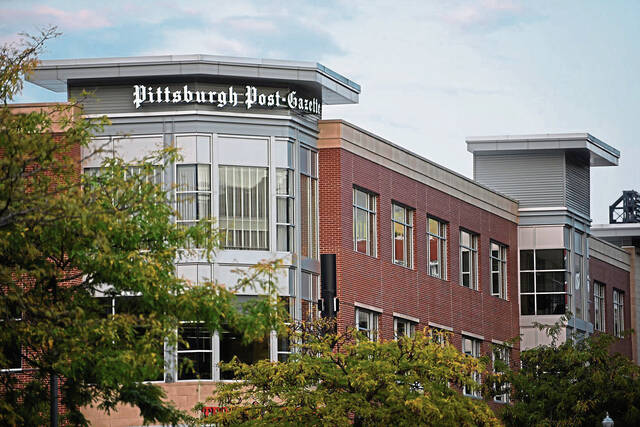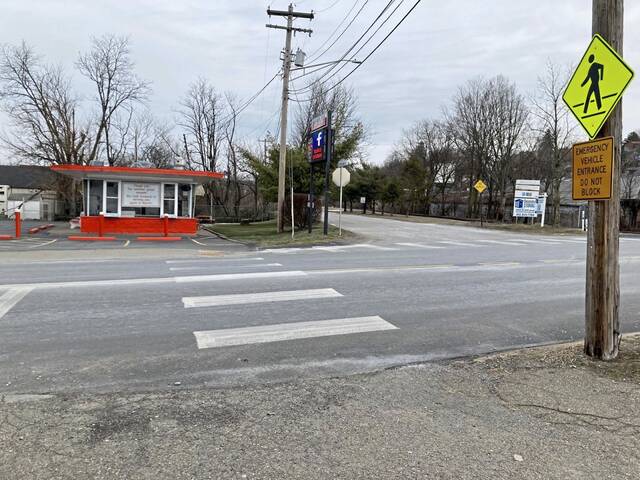A Western Pennsylvania municipality is using a newspaper strike to illustrate why the state’s highest court should allow it to advertise public notices online, the latest in an ongoing battle over who can advertise — and in what format — for governmental bodies.
Scott Township filed paperwork with the state Supreme Court, seeking relief from restrictions that require it to advertise public meetings and related business in a print newspaper. It also simultaneously filed for relief in Commonwealth Court, Township Solicitor John Vogel said.
A state Supreme Court representative said it was undecided if the court would hear the case.
As five Pittsburgh Post-Gazette unions strike against the organization’s owners, the newspaper is being printed bi-weekly in Butler County, which is causing distribution interruptions that keep the paper from reaching all five ZIP codes in Scott Township, court papers read. Without a print newspaper circulating in Scott, the municipality cannot meet requirements of posting public notices, its officials claim.
“Because we cannot advertise, we are essentially unable to function,” Scott Township Commissioner Sam Dalfonso told the Tribune-Review. “We are unable to advertise or adopt our budget for next year. We are unable to hold special meetings, zoning hearing board hearings, or even adopt ordinances at this time because we cannot advertise.”
A Pittsburgh Post-Gazette spokesperson said the organization is “aware of the lawsuit filed by Scott Township.”
“The Post-Gazette has been and continues to be published, printed and distributed widely, including in every ZIP Code in Scott Township,” spokesperson Allison Latcheran told the Tribune-Review.
Opponents, however, say the move is just the latest attempt to strip newspapers and newspaper readers of a trusted source of information, and going online only with postings causes harm to those without Internet access.
“It’s not a new issue — it’s something we’ve addressed legislatively for years,” said Melissa Melewsky, media law counsel for the Pennsylvania News Media Association.
“A society changes and newspapers change to reflect the communities they serve,” Melewsky said. “There are large groups that still don’t have the means for digital-only distribution. You can’t just plop something online and say it’s the same thing as a newspaper. We are not a fully connected society so the law cannot say we are a fully connected society — that will cut out a portion of the population.”
Pointing to distribution problems caused by the Post-Gazette strike, Scott officials told the courts they would advertise public notices on the municipal website and on a community bulletin board at its municipal building. Vogel stressed Scott was not taking a position on the Post-Gazette strike, instead talking about the governmental implications it was causing.
The Pittsburgh Post-Gazette was unavailable for comment Monday.
Stuart L. Knade, chief legal officer for Pennsylvania School Boards Association, said “the increasingly limited ability” to publish notices in print newspapers “has been a growing problem for school districts all across Pennsylvania.”
“PSBA has for years contended that the General Assembly should amend the Sunshine Act and other laws requiring legal notices to be amended to recognize that website advertising, whether in the advertising within a newspaper’s online edition or on the school district website, should be sufficient,” Knade said in a statement. “In reality, online notice and/or advertising is more likely these days to get word out. When citizens want to know when and where the school board is meeting, they don’t go looking for a notice buried in the fine print of the legal advertising section of a print newspaper; they call the school district or go to the district’s website for that information.”
That sentiment was echoed by the Pennsylvania Municipal League this week.
“There’s definitely a trend to seek electronic notification — all the local government groups in Pennsylvania have supported that legislation for as long as I’ve been around, maybe 10 years,” said John Brenner, the league’s executive director. “It’s a costly issue for local government, when you have to spend a lot of money for an ad no one will read. It just boggles the mind why Pennsylvania can’t modernize.”
But newspapers are the intended home for these sorts of advertisements, which benefit society in many ways, according to Melewsky.
“Great journalism results from [public notices] and public policy results from it,” Melewsky said. “It’s such a critical thing. You have to be careful with what you do with public notices.”








